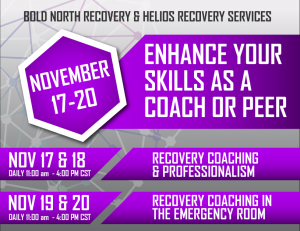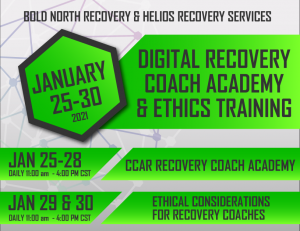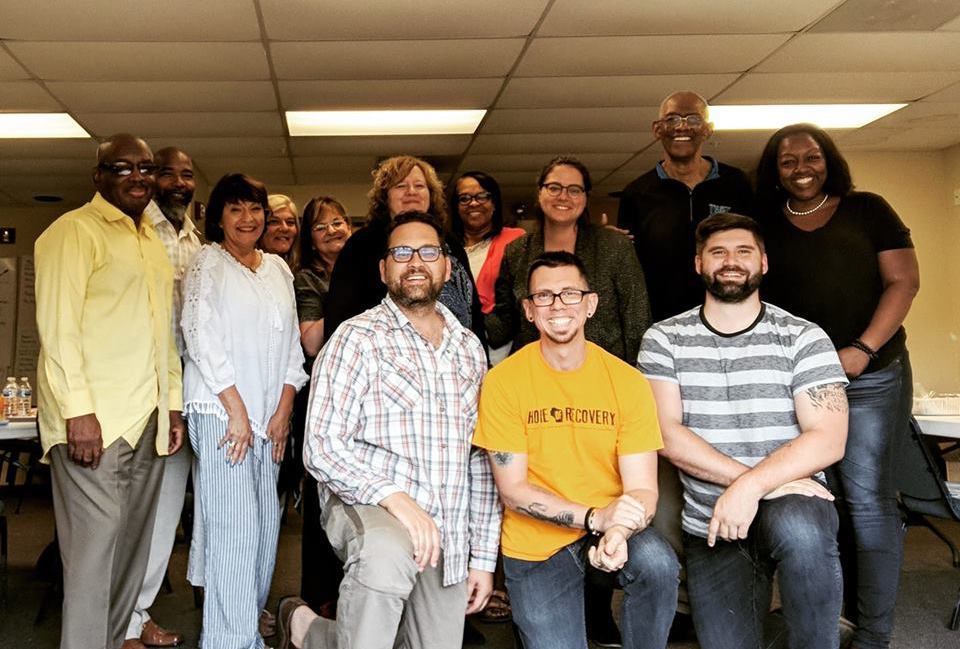Welcome back. This is the second entry of a series of blogs about Recovery Coaching for National Recovery Month. In the last piece, I shared part of my pathway to recovery and how I became a CCAR Core Trainer and Recovery Coach Professional. Over the years of training, consulting, connecting and observing, I’ve incorporated new tools and concepts. They may not be specifically related to the substance use recovery field; however, they do share common values and themes. One of those concepts that resonates with me deeply is Healing Centered Engagement.
Healing Centered Engagement
In May of 2018, someone sent me a link to an article entitled, The Future of Healing: Shifting From Trauma Informed Care to Healing Centered Engagement by Shawn Ginwright Ph.D. The article focused on how reintroducing black youth to a culturally engaged system and community can restore and heal in ways traditional methods may not be able to. I felt like I had found the long-lost language of the recovery elders who first created the art of healing through story and peer connection.
I believe there is an undercurrent of this approach in the recovery movement that Recovery Coaches can bring to the forefront. This article and practice reminded me of William White’s book, Pathways from the Culture of Addiction to the Culture of Recovery, in which recovery is introduced as a cultural phenomenon and describes the cultural aspects, key roles, and milestones that most people share when they move out of their substance use culture into a new world that promotes healthy ways of living. I got the sense that this concept has been here a long time.
4 Main Aspects of HCE
The poignancy of the article’s invitation comes out in 4 main aspects of what HCE is:
- Explicitly political, rather than clinical. Communities, and individuals who experience trauma are agents in restoring their own well-being.
- Culturally grounded and views healing as the restoration of identity. This process highlights the intersectional nature of identity. It encompasses the ways in which culture offers a shared experience, community and sense of belonging.
- Asset-driven and focus on well-being, rather than symptoms to suppress.
An asset-driven strategy acknowledges that people are much more than the worst thing that happened to them. It builds upon their experiences, knowledge, skills and curiosity as positive traits to enhance. - Supports providers with their own healing. Healing is ongoing process that we all need, not just people who experience trauma. The well-being of the provider is a critical factor in supporting other peoples’ well-being.
The article goes on to say, “Trauma informed care correctly highlights the specific needs for individuals who have exposure to trauma. However, current formulations of trauma informed care presume that the trauma is an individual experience, rather than a collective one. Also, that the term trauma informed care runs the risk of focusing on the treatment of pathology (trauma), rather than fostering the possibility (well-being).”
Possibility, not Pathology
That part about focusing on possibility rather than pathology resonated with me. I first heard those words in my 2014 CCAR Recovery Coach Training. As the recovery movement continues to expand its threshold of creating both responsive and thriving community presence, we can apply the same strength-based, asset-driven approach Recovery Coaches provide to our communities and systems.
Facilitating the Healing
We can view the word trauma as interchangeable with substance use, in that it is rarely an isolated circumstance. Usually, some culmination of genetics, environment and conditions causes the problem. It’s akin to the parable of taking a sick frog out of a lake to make it well, only to bring him back and see him get sick again. The lake needs to heal too. We need Recovery Carriers to facilitate that healing.
The contagion of addiction is transmitted through a process of infection—the movement of addiction disease from one vulnerable person to another. The contagion of recovery is spread quite differently—not through infection, but affection. Those who spread such affection are recovery carriers. Recovery carriers—because of the nature of their character and the quality of their lives—exert a magnetic attraction to those who are still suffering.
– Recovery is Contagious, William White
The Big “A” Advocate
A healing-centered approach is holistic. It involves culture, spirituality, civic action, and collective healing. It is the approach of Recovery Coaches. One of the roles a Recovery Coach has is that of the big “A” advocate. There is a calling many have heard to share their stories and experiences to create change in their communities, influence policy, and call for greater access to care. When we view recovery not simply as an individual isolated experience, but rather one in which we experience recovery and healing collectively, we can transform our surroundings.
What’s Right Within You?
Often times, during a training, people will ask, “is this considered a trauma-informed training?” I reply by saying that it is not a certified TIC training, however, it certainly covers the five TIC principles. The TIC principles include Safety, Trustworthiness, Choice, Collaboration, and Empowerment. Perhaps it was through intention, or foresight, that the training wove these elements throughout. The practices taught go beyond asking what happened you, to “what’s right within you?”
As an advocate, coach and trainer, I am continuously asked to look at my own stuff. The challenging part of embracing a healing centered approach is being willing to apply this to myself as well. I entered therapy at 10 years in recovery to address decades old trauma that started to emerge.
Up to this point, I primarily engaged in fellowship meetings and mentorship. Many of the approaches I experienced were rooted in punitive, deficit-based mentalities of moral failings and dogmatic corrective strategies. I don’t regret any of these approaches—I am grateful for what they offered at the time. I am curious, though, about what would have happened if someone asked what my strengths were. If I had the opportunity to look at what was right in life, before the inventories and wound navigation that, for me, always started in the red. This self-reflective application of asking honestly and mindfully “what is right, or ok” in this moment has been a key aspect in personal transformation. As a coach, it has helped me walk with Recoverees who are navigating their own path.
Adapting Client Interactions to Incorporate HCE
I included some parts of this article in a workshop I facilitated on understanding trauma in the LGBTQ Community. During this workshop, at the Mental Health/Substance Use Conference in Michigan, I presented to a room of primarily treatment and prevention focused participants. I included the four points above, and asked folks to share how this approach could help or change their interactions with clients. It allowed several of the providers to look at how they can apply this framework to their practices.
One person said that they would “start with asking what is right with someone” in the initial intake assessment, rather than running them through the gauntlet of what they did or what happened to them. I wonder how someone’s experience entering recovery would be different if all systems and approaches started there. What if someone simply asked them, “What can we do for your recovery today?”
Making HCE an Everyday Term
HCE is the language we need to evolve the vocabulary in the recovery field. It better depicts what the essence of recovery coaching is. In Phil Valentines November 2018 blog, “I am not culturally competent,” he talks about how “cultural competency” was the thing. Gratefully, we have the upgraded “cultural humility” now. We can do the same with the term “trauma-informed care”. We can start introducing this term as the newest, shiniest thing when we sit down with someone, and not ask, “what happened to you?” but rather “what’s right with you?” So, I would like to propose we incorporate HCE, or Healing Centered Engagement, to our everyday vernacular here on out.
Like Dr Ginwright laid out, in the potential of HCE for young black males in Oakland, CA for a culturally grounded restorative approach of healing, so too can the recovery community learn from this model of application. A key aspect of Recovery Coaching is practicing Cultural Humility. This is described as, “A lifelong process of learning, self-examination and refinement of one’s own awareness, knowledge, behavior and attitudes on the interplay of power, privilege and social contexts.” Next week’s article will look at this interplay, and how coaches address these issues on the front lines.

November 17-20 / 11:00 am – 4:00 pm
Location: Digital online
Cost: $500
Register: Contact Randy Anderson at boldnortherrecovery.com
More info at: www.heliosrecovery.com

January 25-30 11:00 am – 4:00 pm
Location: Digital online
Cost: $650.00
Register: Contact Randy Anderson at boldnortherrecovery.com
More info at: www.heliosrecovery.com








